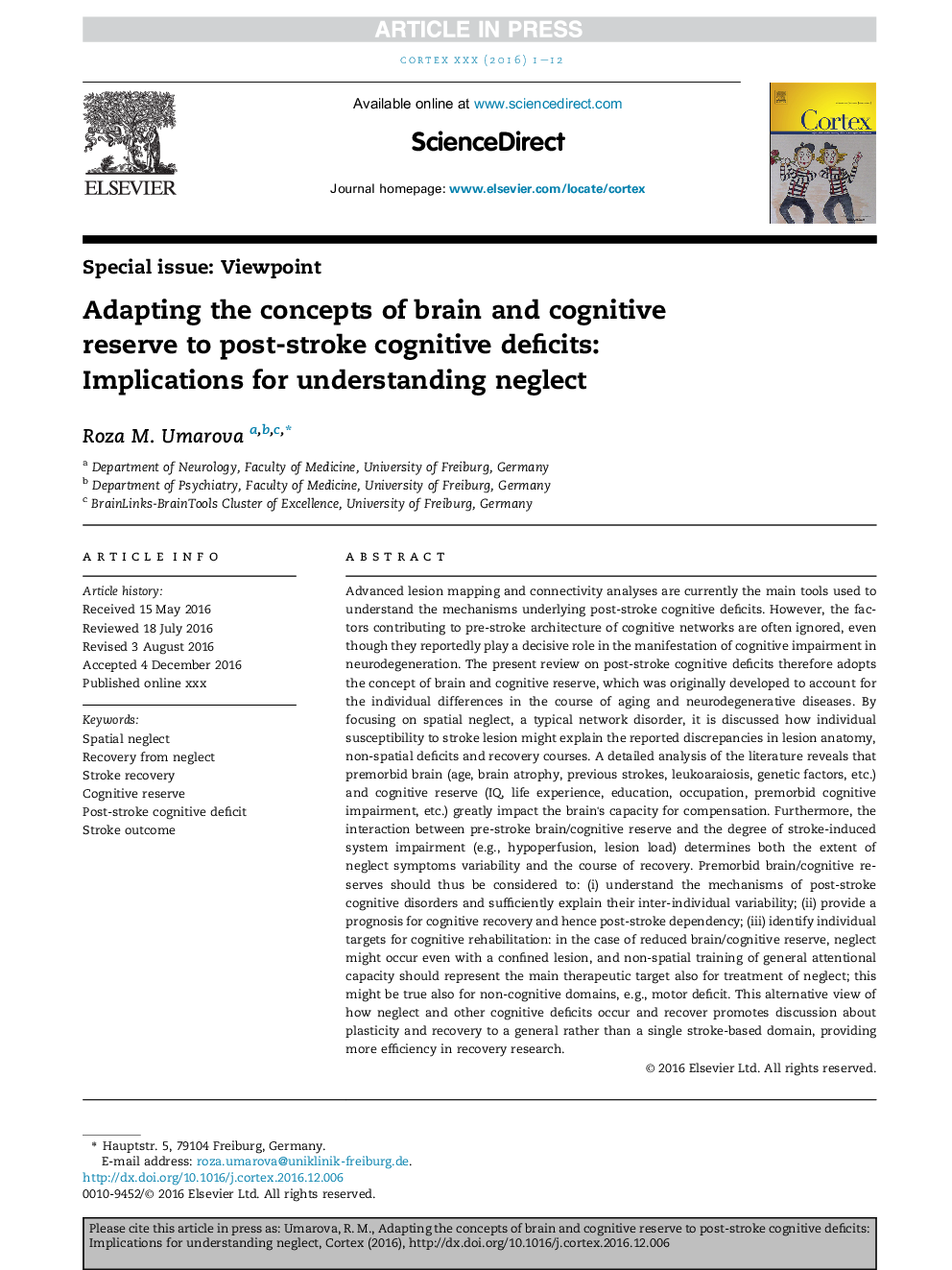| کد مقاله | کد نشریه | سال انتشار | مقاله انگلیسی | نسخه تمام متن |
|---|---|---|---|---|
| 7312354 | 1475435 | 2017 | 12 صفحه PDF | دانلود رایگان |
عنوان انگلیسی مقاله ISI
Adapting the concepts of brain and cognitive reserve to post-stroke cognitive deficits: Implications for understanding neglect
ترجمه فارسی عنوان
انطباق مفاهیم مغز و ذخایر شناختی با نقص شناختی پس از سکته مغزی: پیامدهای برای فهم غفلت
دانلود مقاله + سفارش ترجمه
دانلود مقاله ISI انگلیسی
رایگان برای ایرانیان
کلمات کلیدی
بی توجهی فضایی، بازیابی از غفلت، بهبود سکته مغزی، ذخایر شناختی، کمبود شناختی پس از سکته مغزی، نتیجه استروک،
موضوعات مرتبط
علوم زیستی و بیوفناوری
علم عصب شناسی
علوم اعصاب رفتاری
چکیده انگلیسی
Advanced lesion mapping and connectivity analyses are currently the main tools used to understand the mechanisms underlying post-stroke cognitive deficits. However, the factors contributing to pre-stroke architecture of cognitive networks are often ignored, even though they reportedly play a decisive role in the manifestation of cognitive impairment in neurodegeneration. The present review on post-stroke cognitive deficits therefore adopts the concept of brain and cognitive reserve, which was originally developed to account for the individual differences in the course of aging and neurodegenerative diseases. By focusing on spatial neglect, a typical network disorder, it is discussed how individual susceptibility to stroke lesion might explain the reported discrepancies in lesion anatomy, non-spatial deficits and recovery courses. A detailed analysis of the literature reveals that premorbid brain (age, brain atrophy, previous strokes, leukoaraiosis, genetic factors, etc.) and cognitive reserve (IQ, life experience, education, occupation, premorbid cognitive impairment, etc.) greatly impact the brain's capacity for compensation. Furthermore, the interaction between pre-stroke brain/cognitive reserve and the degree of stroke-induced system impairment (e.g., hypoperfusion, lesion load) determines both the extent of neglect symptoms variability and the course of recovery. Premorbid brain/cognitive reserves should thus be considered to: (i) understand the mechanisms of post-stroke cognitive disorders and sufficiently explain their inter-individual variability; (ii) provide a prognosis for cognitive recovery and hence post-stroke dependency; (iii) identify individual targets for cognitive rehabilitation: in the case of reduced brain/cognitive reserve, neglect might occur even with a confined lesion, and non-spatial training of general attentional capacity should represent the main therapeutic target also for treatment of neglect; this might be true also for non-cognitive domains, e.g., motor deficit. This alternative view of how neglect and other cognitive deficits occur and recover promotes discussion about plasticity and recovery to a general rather than a single stroke-based domain, providing more efficiency in recovery research.
ناشر
Database: Elsevier - ScienceDirect (ساینس دایرکت)
Journal: Cortex - Volume 97, December 2017, Pages 327-338
Journal: Cortex - Volume 97, December 2017, Pages 327-338
نویسندگان
Roza M. Umarova,
